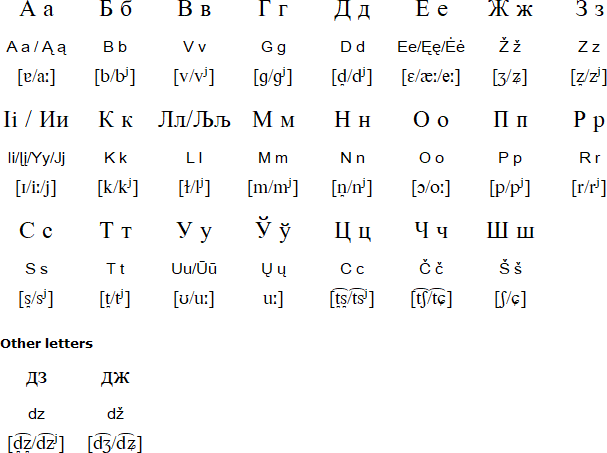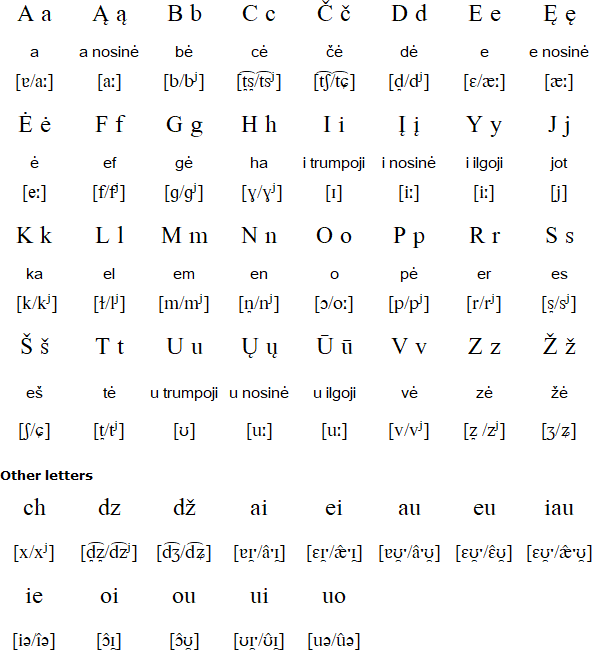Lithuanian is an Eastern Baltic language spoken mainly in Lithuania by about 2.9 million people. There are also speakers of Lithuanian in a number of other countries, including the UK (91,700), Germany (53,200), Norway (39,300), the USA (39,800), and the Russian Federation (31,300) [source].
Lithuanian is related to Latvian and Old Prussian. It is thought to be the most conservative of the Indo-European languages currently spoken, and retains elements of Proto-Indo-European not found in other modern Indo-European languages.
Lithuanian first appeared in print in 1547 in a catechism. The first Lithuanian dictionary was printed during the 17th century. Between 1864 and 1904 the printing and teaching of Lithuanian was banned; Russian, Polish, Belarusian or Latin had to be used instead. However, some material was published in Lithuanian using the Cyrillic alphabet. Various spelling systems were used, such as the one below. After this ban was lifted in 1904, there was a resurgence of Lithuanian literature.

Source: Дíевiшка лiтургija швэнто Jóно Аŷксобýрнio (Dieviška liturgija švento Jono Auksaburnio / Divine liturgy of Saint John Chrysostom) (1887)
From 1918 to 1940, the nation of Lithuania was independent, and over 7,000 books in Lithuanian were published. Since 1991, when Lithuania once more gained its independence, a large number of publications in Lithuanian has appeared, including newspapers, magazines and scientific and technical works.
Lithuanian is the state language of Lithuania and one of the official languages of the European Union (EU). It is also recognised as a minority language in Poland.

Listen to Augustinas Žemaitis reading the Lithuanian alphabet
Download a Lithuanian alphabet chart (Excel)
Visi žmonės gimsta laisvi ir lygūs savo orumu ir teisėmis. Jiems suteiktas protas ir sąžinė ir jie turi elgtis vienas kito atžvilgiu kaip broliai.
Listen to Augustinas Žemaitis reading this text
All human beings are born free and equal in dignity and rights. They
are endowed with reason and conscience and should act towards one another
in a spirit of brotherhood.
(Article 1 of the Universal Declaration of Human Rights)
Information about Lithuanian | Phrases | Numbers | Family words | Idioms | Tower of Babel | Learning materials

Information about Lithuanian
http://postilla.mch.mii.lt/Kalba/kalbarast.en.htm
http://en.wikipedia.org/wiki/Lithuanian_language
https://www.ethnologue.com/language/lit
Online Lithuanian lessons
http://www.debeselis.net
http://www.slic.org.au/Language/
http://www.lithuanian.libsyn.com
http://www.youtube.com/user/LTvideocourse
http://polymath.org/lithuanian.php
Online Lithuanian phrases
http://www.debeselis.net/phrases.php
http://www.bbc.co.uk/languages/other/quickfix/lithuanian.shtml
http://www.linguanaut.com/english_lithuanian.htm
Online Lithuanian dictionaries
https://www.lexilogos.com/english/lithuanian_dictionary.htm
http://www.lingvozone.com/LingvoSoft-Online-English-Lithuanian-Dictionary
http://www.lkz.lt/
http://lkiis.lki.lt/
http://www.zodynas.lt
http://www.lietuviuzodynas.lt
https://www.angluzodynas.lt/
Online Lithuanian news
http://www.omni.lt
Online Lithuanian radio
http://www.lrt.lt
http://www.ziniuradijas.lt
http://saulesradijas.lt
http://www.radijas.fm
Latgalian, Latvian, Lithuanian, Samogitian
Abaza, Abkhaz, Adyghe, Aghul, Akhvakh, Akkala Sámi, Aleut, Altay, Alyutor, Andi, Archi, Assyrian / Neo-Assyrian, Avar, Azeri, Bagvalal, Balkar, Bashkir, Belarusian, Bezhta, Bosnian, Botlikh, Budukh, Bulgarian, Buryat, Chamalal, Chechen, Chelkan, Chukchi, Chulym, Chuvash, Crimean Tatar, Dargwa, Daur, Dolgan, Dungan, Enets, Erzya, Even, Evenki, Gagauz, Godoberi, Hinukh, Hunzib, Ingush, Interslavic, Itelmen, Juhuri, Kabardian, Kaitag, Kalderash Romani, Kalmyk, Karaim, Karakalpak, Karata, Karelian, Kazakh, Ket, Khakas, Khanty, Khinalug, Khorasani Turkic, Khwarshi, Kildin Sámi, Kili, Komi, Koryak, Krymchak, Kryts, Kubachi, Kumandy, Kumyk, Kurdish, Kyrgyz, Lak, Lezgi, Lingua Franca Nova, Lithuanian, Ludic, Macedonian, Mansi, Mari, Moksha, Moldovan, Mongolian, Montenegrin, Nanai, Negidal, Nenets, Nganasan, Nivkh, Nogai, Old Church Slavonic, Oroch, Orok, Ossetian, Pontic Greek, Romanian, Rushani, Russian, Rusyn, Rutul, Selkup, Serbian, Shor, Shughni, Siberian Tatar, Sirenik, Slovio, Soyot, Tabassaran, Tajik, Talysh, Tat, Tatar, Teleut, Ter Sámi, Tindi, Tofa, Tsakhur, Tsez, Turkmen, Tuvan, Ubykh, Udege, Udi, Udmurt, Ukrainian, Ulch, Urum, Uyghur, Uzbek, Veps, Votic, Wakhi, West Polesian, Xibe, Yaghnobi, Yakut, Yazghulami, Yukaghir (Northern / Tundra), Yukaghir (Southern / Kolyma), Yupik (Central Siberian)
Page last modified: 14.01.24
[top]
You can support this site by Buying Me A Coffee, and if you like what you see on this page, you can use the buttons below to share it with people you know.

If you like this site and find it useful, you can support it by making a donation via PayPal or Patreon, or by contributing in other ways. Omniglot is how I make my living.
Note: all links on this site to Amazon.com, Amazon.co.uk
and Amazon.fr
are affiliate links. This means I earn a commission if you click on any of them and buy something. So by clicking on these links you can help to support this site.
[top]
Shipping time world-
wide is typically 6 days.